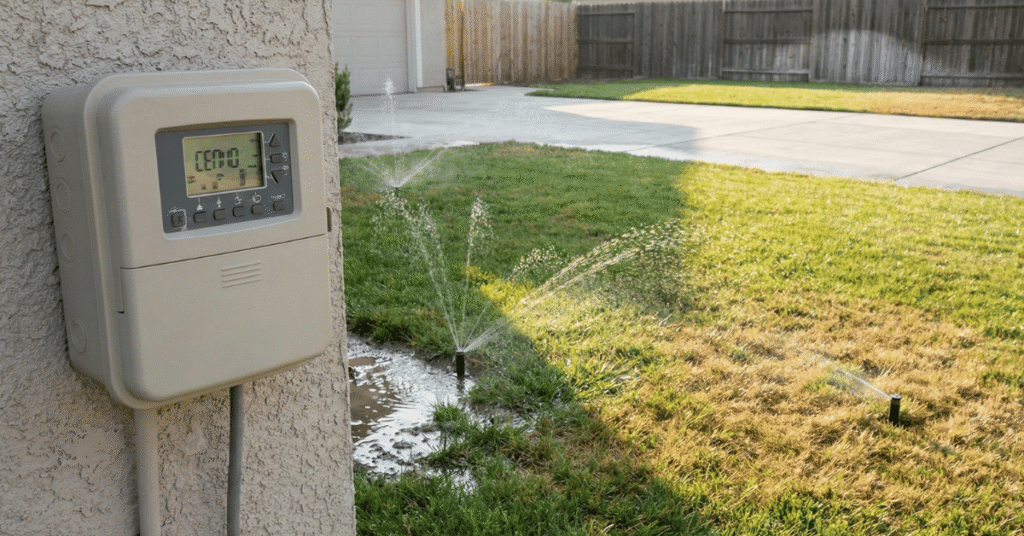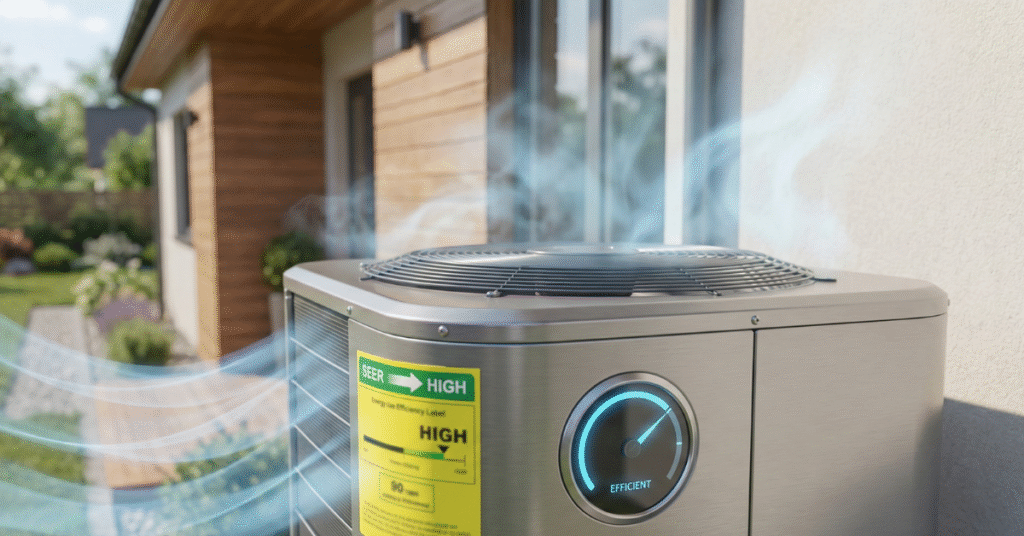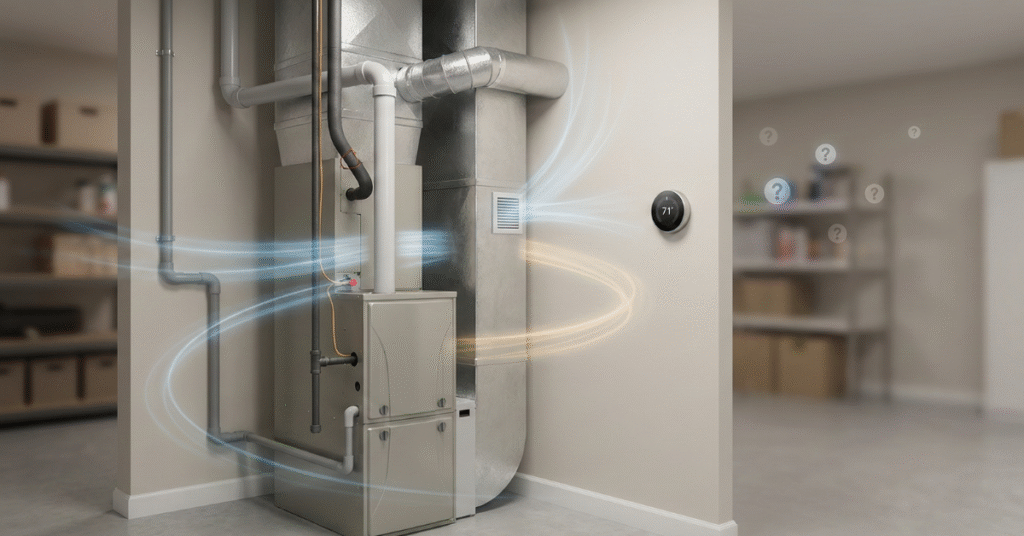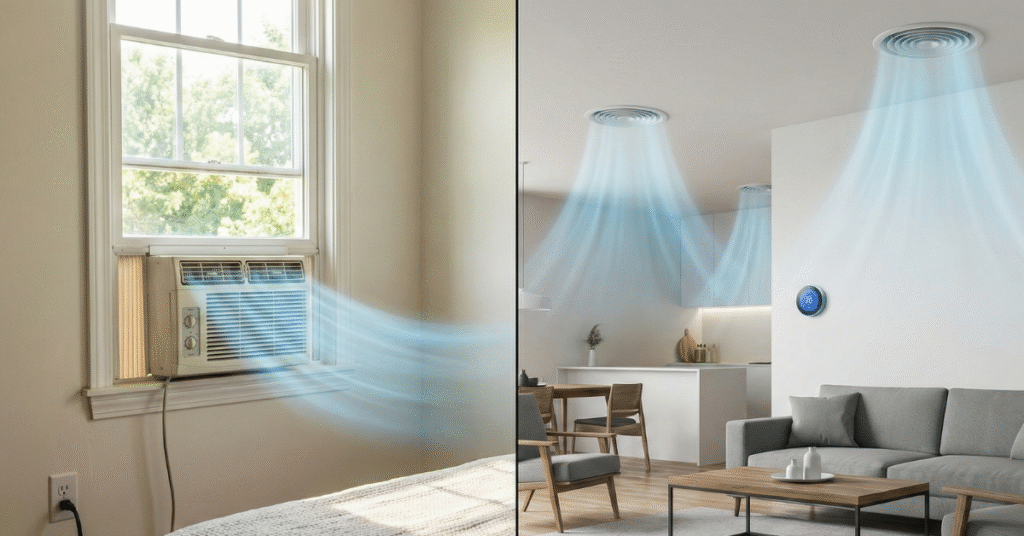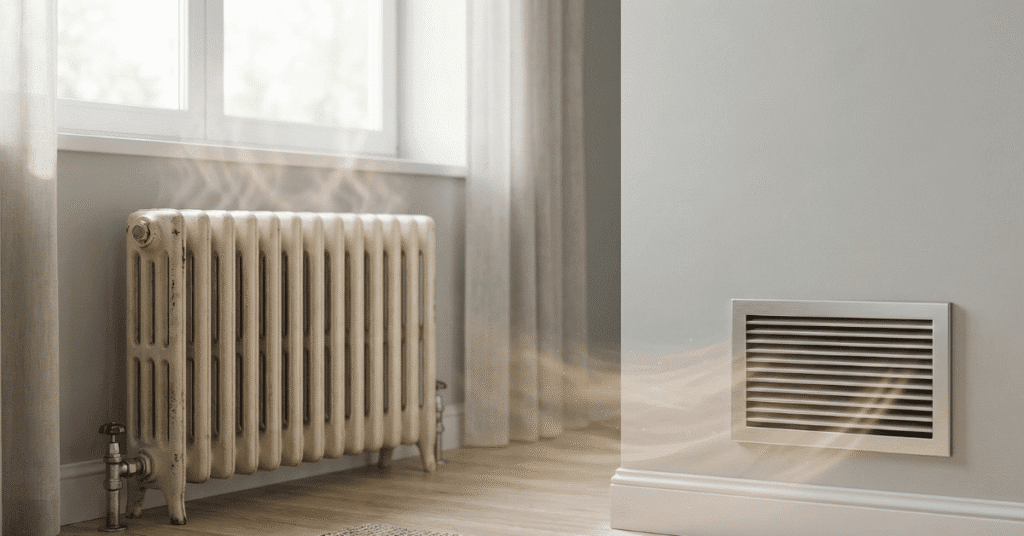When summer arrives and temperatures soar, a well-functioning air conditioner becomes essential for every homeowner. However, even the best AC system can fail over time due to age, skipped maintenance, or minor wear and tear. Understanding the 5 most common air conditioner problems helps you recognize warning signs early, troubleshoot issues quickly, and avoid costly repair or installation replacements.
13 AC Problems to Be Aware Of Before Summer Hits
In this guide, we’ll explore the common AC problems that affect both residential and commercial systems, their main causes, and the best ways to keep your air conditioning running cool and efficient through regular cleaning and professional HVAC service.
1. Why Is My AC Not Cooling Properly?
A common AC problem every homeowner faces is when the AC isn’t cooling properly. Your air conditioner’s ability to cool your home depends on several key components working properly from the thermostat and filter to the refrigerant and coil.
If you notice warm or uneven air, your system might be signaling trouble inside the air conditioning unit.
Main reasons your air conditioner isn’t cooling:
- Dirty air filter: A clogged air filter blocks airflow, causing poor air conditioning efficiency.
- Low refrigerant levels: A refrigerant leak or under-charged system prevents proper cooling the air.
- Blocked condenser coil: Dirt and debris can block heat transfer in the condenser unit.
- Thermostat problems: Incorrect settings or faulty wiring disrupt the AC unit’s ability to respond.
To prevent this common problem, perform regular AC maintenance, including filter cleaning, coil inspection, and refrigerant level checks. If your AC system still isn’t cooling the air, a qualified technician can repair the issue and restore comfort.
2. What Causes Strange Noises in an AC Unit?
Your air conditioner should operate smoothly and quietly. Unusual sounds indicate specific problems that shouldn’t be ignored.
Common noises and their causes:
- Rattling: Loose screws, damaged panels, or an unbalanced AC fan.
- Buzzing: Possible electrical issue or a failing compressor.
- Hissing: May indicate a refrigerant leak or pressure imbalance.
- Squealing: Worn-out belts or motor bearings inside the air handler.
Shut off the unit immediately if you hear these noises. Ignoring them can damage the compressor or evaporator coil, leading to expensive AC repair. Scheduling regular AC cleaning and professional tune-ups will help prevent these common issues.

3. Why Is My Air Conditioner Leaking Water or Refrigerant?
Water or refrigerant leaks are among the most common air conditioner problems. Small condensation is normal, but visible water pooling or ice buildup means something isn’t working properly.
Common causes of AC leaks include:
- Clogged condensate drain line: Dust and mold restrict water flow, causing overflow.
- Frozen evaporator coil: Caused by low refrigerant or a dirty air filter.
- Cracked drain pan: Aging systems can develop cracks that let water escape.
- Refrigerant leak: Low refrigerant levels not only reduce cooling but harm the environment.
Turn off the AC system if you see a leak. A trained HVAC technician can inspect the condensate drain line, drain pan, and refrigerant lines to repair them safely and ensure your air conditioner operates efficiently again.
4. Why Does My AC Keep Turning On and Off (Short Cycling)?
Short cycling is a common air conditioning problem that causes your AC unit to start and stop repeatedly before finishing a full cycle. This not only strains your compressor but also increases energy bills.
Possible reasons for short cycling:
- Dirty condenser or evaporator coil reducing heat transfer.
- Oversized unit that cools air too fast, then shuts down early.
- Low refrigerant or thermostat issues affecting system timing.
- Electrical issue with the circuit breaker or wiring.
If your air conditioner runs constantly or keeps tripping the circuit breaker, call an HVAC professional to troubleshoot. Ignoring the signs may lead to compressor failure and more serious air conditioning repair needs later.
5. Why Is There Weak or No Airflow from My Vents?
Weak airflow or no air coming from the vents is a frustrating sign that your AC system isn’t cooling the air effectively.
Common causes include:
- Dirty or clogged air filter reducing air flow.
- Leaky ducts letting air escape before it reaches your rooms.
- Blower fan failure or debris buildup.
- Blocked vents caused by furniture or curtains.
A dirty air filter is often the culprit and one of the most common AC issues. Cleaning or replacing it regularly improves both airflow and indoor air quality. For persistent issues, schedule duct cleaning, blower motor repair, or full HVAC inspection.
6. How Does a Dirty Air Filter Affect Air Conditioning Performance?
The air filter plays a crucial role in protecting your AC system. A dirty filter or clogged air filter restricts airflow and forces your air conditioner to work harder. This not only wastes energy but can lead to frozen coils, warm air, or system overheating.
Cleaning and replacement tips:
- Replace filters every 1–3 months depending on dust and pet presence.
- Use high-quality filters for better indoor air quality.
- Schedule regular AC maintenance to prevent buildup inside coils.
Clean filters also prevent the evaporator coil from freezing and improve air conditioning efficiency across your home.
7. How to Troubleshoot Low Refrigerant or Refrigerant Leaks
When your AC isn’t cooling, low refrigerant levels are often to blame. This vital chemical helps your air conditioner absorb heat and cool air effectively.
Signs of low refrigerant or leaks:
- Hissing or bubbling noises near lines.
- Ice on the evaporator coil or outdoor unit.
- Reduced ability to cool or longer cycles.
A refrigerant leak can damage your AC compressor if not handled promptly. Only a licensed technician should inspect and repair leaks, refill refrigerant, and balance system pressure levels. This ensures safe and efficient air conditioning repair.
8. What Happens When the Compressor or Condenser Fails?
The compressor and condenser unit are essential components that maintain the AC system’s ability to cool air.
Compressor failure signs:
- Clicking or humming sounds when you turn on the AC.
- The AC isn’t blowing cold air.
- Tripped circuit breaker or unusual smells.
The condenser removes heat from the system. Dirt or clogs in its coils can cause the unit to overheat. Routine cleaning of the outdoor unit, coil inspection, and professional HVAC repair help prevent compressor burnout one of the most common problems homeowners face with older systems.

9. How to Prevent Clogs in Condensate Lines and Drain Pans
A clogged condensate drain line or full drain pan can cause water damage or system shutdowns.
Prevention steps:
- Pour a mild vinegar solution monthly to clean the drain line.
- Inspect for clogged air or algae buildup.
- Replace cracked drain pans to avoid leaks.
This simple maintenance step helps prevent condensate overflow and keeps your air conditioner running smoothly without water issues.
10. What Maintenance Keeps Your AC Working Properly Year-Round?
Regular AC maintenance is the easiest way to avoid expensive HVAC repair. Keeping every component clean, balanced, and leak-free extends your system’s lifespan and ensures consistent cool air delivery.
Maintenance checklist:
- Clean or replace air filters regularly.
- Inspect refrigerant levels and connections for leaks.
- Clean coils, condenser, and evaporator.
- Test thermostat and ensure batteries are working.
- Check for signs of electrical issues or tripped breakers.
These tasks not only keep the AC system efficient but also improve indoor air quality while reducing energy consumption.
11. When Should You Call an HVAC Technician?
Some air conditioning problems can be fixed with basic cleaning, but others require certified technicians.
Call for professional service if:
- The AC blows warm air or cycles too frequently.
- There’s a persistent smell of burning or chemicals.
- You see ice on coils or frequent trips in the circuit breaker.
- The air conditioner isn’t turning on or air is blowing weakly.
Professional HVAC experts can diagnose specific problems, handle refrigerant leak repair, or perform full installation safely. Don’t attempt complex electrical or refrigerant work on your own it can worsen the problem or void your warranty.
12. What Are the Benefits of Regular AC Cleaning and Professional Maintenance?
Regular AC cleaning and inspection offer multiple benefits:
- Increases cooling efficiency and reduces common HVAC failures.
- Prevents low refrigerant, clogs, and dirty filters.
- Extends the life of your air conditioning system.
- Ensures better airflow and indoor air quality.
Air filters can help prevent dust buildup and improve your air conditioner’s ability to cool consistently. Combining DIY cleaning with professional servicing ensures your air conditioning installation stays in top condition.
13. Common Problems Homeowners Face with Central Air Conditioners
Central air conditioners are complex systems that require balance between airflow, refrigerant, and electrical control.
Frequent issues include:
- Low refrigerant due to leaks.
- Dirty coils reducing cooling efficiency.
- Clogged filters restricting air flow.
- Electrical issues leading to system trip or non-response.
Regular inspection of air handler, condenser unit, and compressor ensures all parts are working properly. For recurring common air conditioning troubles, request professional AC troubleshooting from a trusted HVAC company.

Conclusion
Your air conditioner is a vital system that keeps your home cool and comfortable through the hottest months. Recognizing and addressing the 5 most common air conditioner problems from low refrigerant to dirty air filters, clogs, and compressor issues helps maintain efficient operation and reduce costly repairs.
A consistent cleaning and maintenance routine, combined with help from a qualified HVAC technician, ensures your air conditioning system runs at peak performance all year long.
When in doubt, schedule professional air conditioning repair or installation to keep the AC running efficiently, improve indoor air quality, and enjoy reliable cooling the air throughout your home.



